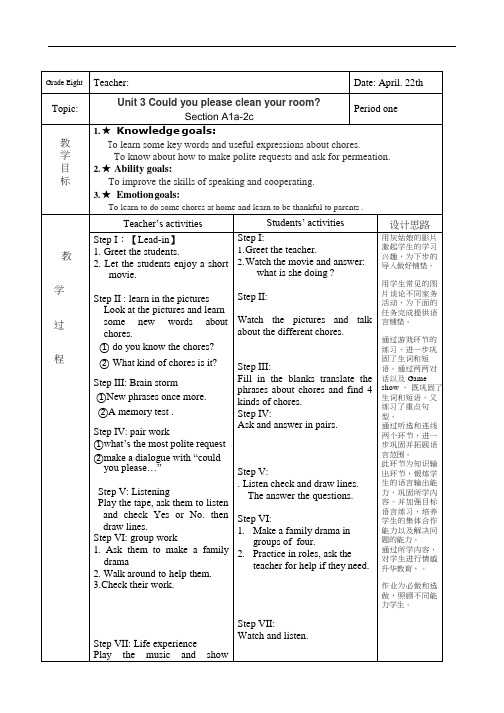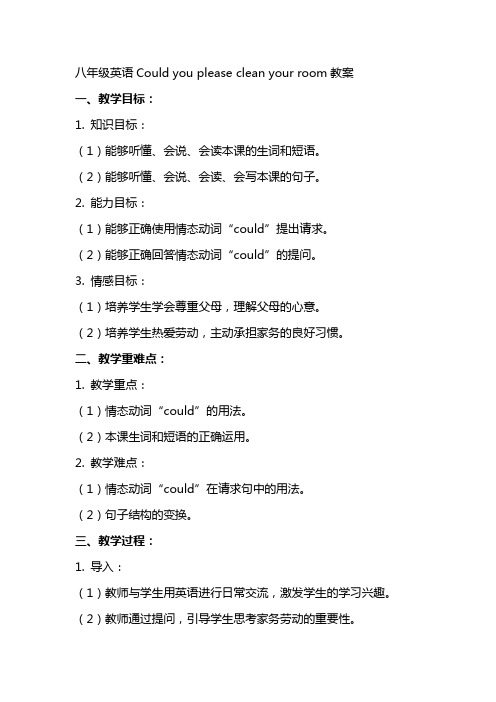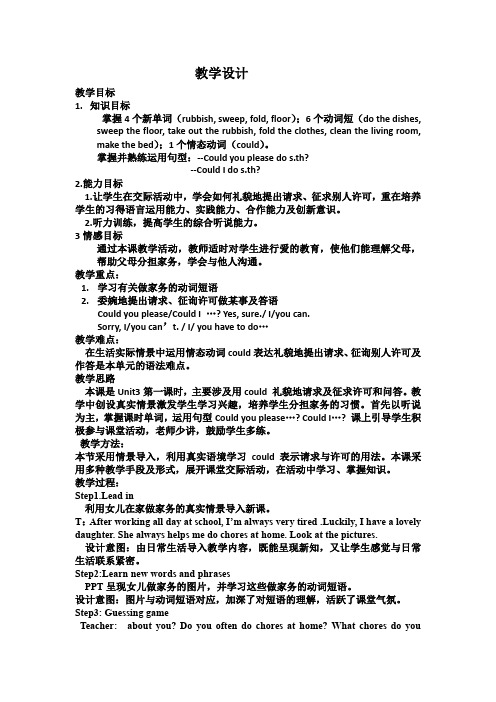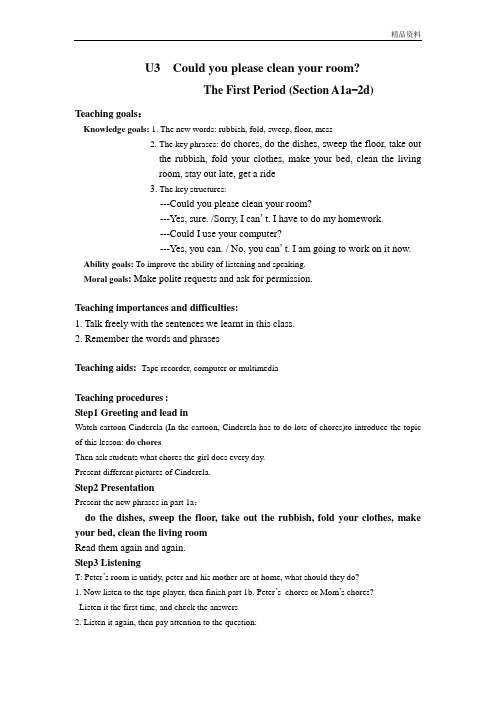八年级英语下册 Unit 3 Could you please clean your room Period 1教学设计 (新版)人教新目标板
八年级英语下册 Unit 3 Could you please clean your room?教案

Unit 3 Could you please clean your room?Section B 2a-2e教学设计一、教学目标:1. 语言知识目标:1)复习本单元已学词汇及句型;2) 继续练习怎样礼貌委婉地提出请求或允许;3)通过阅读,学会思考,找到能支持自己观点的理由,形成自己的思维观点,并能够在辩论中清晰表达出来,最终形成书面材料。
2. 能力目标1)学会怎样辩论并简洁明了地表达出自己的观点;2)练习说、读、写技巧;3)能够关于孩子做家务问题对周围人进行采访,并生成书面记录。
3. 情感态度价值观目标:本课时学习内容贴近学生的日常生活,学生可以利用所学内容谈论自身在家做家务情况,通过对于孩子做家务问题的辩论引导学生认识到做家务是每个家庭成员的责任和义务,从而激发其劳动热情,督促其主动帮助父母分担家务,培养其独立意识。
二、学情分析我教的班级学生整体处于中等偏上水平,学生英语基础较好,英语综合能力一般,但学生间英语水平及学习能力差距较大,所以我在教学的过程中尽量设计多种难度水平的活动让大部分学生都参与进来。
八年级下学期是学生提高语言水平及语言整体素质的关键期,学生已经有了一定的词汇量及语言基础,因此老师应尽量设计内容丰富,形式多样的活动来激发学生的学习兴趣及积极性,从而提高学生的语言运用能力及素质。
三、教学重难点1. 教学重点:1)复习本单元所学过的重点短语及句型。
2)完成阅读任务,培养阅读技巧。
3)能够清晰表达自己对做家务一事的看法。
2. 教学难点:1)能够采访周围人对孩子做家务一事的看法,并做书面记录。
2)能够思考并得到找到能支持自己观点的理由,并形成书面材料。
3)通过完成阅读任务提高自己的阅读能力。
四、教学过程I. Warming-up and lead-in1. Greet students as usual and tell students that there is a group competition in which the winner group can get the gift.2.Interview some of the students about whether they do housework at home and what they often do.3. Show the chatting records of parents group about kids doing chores at home to lead in the topic of this class—whether children should do chores at home or not.II. Pre-readingAsk the following two questions:1.What can you know from the chatting records of your parents?2.Do you think kids should do chores at home?III. While-reading1.Students read the two letters quickly to find out which one agrees and which one disagrees and give the reasons.2.Introduce the reading skill “Skimming”—looking quickly through a piece of writing to find the main idea without reading every word. It is still a good idea to read the first sentence in each paragraph quickly.3.Students read the examples already given in 2c and guess the meanings of “pros” and “cons”. Ask students to do a group work-- according to Mr. Smith and Ms. Miller, what are the pros and cons about kids doing chores?4.Students read the letters again and fill in the blanks to review the reasons given by Mr. Smith and Ms. Miller.IV. Post-reading.1. Be a good debater. Ask the students choose one side freely and have a debate onwhether children should do chores at home.2. Ask students to prepare for the debate and give some tips to them. Students can use the information they get before class. Students write down their ideas during their preparation.3. Introduce the rules of debate and the debate begins. Students from the positive side and the negative side can stand up and give ideas. The teacher concludes the debate in the end.V. Emotional sublimationShow some pictures of parents who work hard and remind students of the great contributions parents make to our family. Encourage students to be a good helper at home and try their best to do chores. Give the winner group some housework cards to encourage them to do chores at home.VI. HomeworkWrite a passage to express your ideas about kids doing chores at home.五、板书设计Unit 3 Section B 2a-2ekids doing chores at homeMs. Miller VS. Mr. Smithnegative side positive side。
初中英语《Could you please clean your room》优质教学设计、教案

Teacher’s activities
Students’ activities
设计思路
Step I:【Lead-in】
1.Greet thestudents.
2.Let the students enjoy a short movie.
Step II : learn in the pictures Look at the pictures and learn somenewwordsaboutchores.
②make a dialogue with “could
you please…”
Step V: Listening
Play the tape, ask them to listen and check Yes or No. then draw lines.
Step VI: group work
1.Ask them to make afamilydrama
Step IV:
Ask and answer in pairs.
Step V:
. Listen check and draw lines.
The answer the questions.
Step VI:
1.Make a family dramaingroups offour.
2.Practice in roles, asktheteacher for help if theyneed.
Grade Eight
Teacher:
Date: April. 22th
Topic:
Unit 3 Could you please clean your room?
Section A1a-2c
八年级英语Couldyoupleasecleanyourroom教案

八年级英语Could you please clean your room教案一、教学目标:1. 知识目标:(1)能够听懂、会说、会读本课的生词和短语。
(2)能够听懂、会说、会读、会写本课的句子。
2. 能力目标:(1)能够正确使用情态动词“could”提出请求。
(2)能够正确回答情态动词“could”的提问。
3. 情感目标:(1)培养学生学会尊重父母,理解父母的心意。
(2)培养学生热爱劳动,主动承担家务的良好习惯。
二、教学重难点:1. 教学重点:(1)情态动词“could”的用法。
(2)本课生词和短语的正确运用。
2. 教学难点:(1)情态动词“could”在请求句中的用法。
(2)句子结构的变换。
三、教学过程:1. 导入:(1)教师与学生用英语进行日常交流,激发学生的学习兴趣。
(2)教师通过提问,引导学生思考家务劳动的重要性。
2. 新课呈现:(1)教师展示图片,引入本课主题。
(2)教师引导学生听录音,跟读句子,学习生词和短语。
3. 课堂活动:(1)教师组织学生进行小组讨论,分享各自的家务劳动经验。
(2)学生表演对话,巩固所学内容。
4. 练习环节:(1)教师设计练习题,学生听力作答。
(2)教师设计情景,学生运用所学句子进行交流。
5. 总结与拓展:(1)教师引导学生总结本课所学内容。
(2)学生举例说明情态动词“could”的用法。
四、作业布置:1. 抄写本课生词和短语。
2. 运用情态动词“could”写一个请求句。
五、教学反思:教师在课后对自己的教学进行反思,总结教学过程中的优点和不足,为下一节课的教学做好准备。
关注学生的学习情况,针对性地进行辅导,确保学生能够掌握所学知识。
六、教学评价:1. 课堂表现评价:观察学生在课堂上的参与程度、发言积极性以及课堂纪律表现,给予相应的评价。
2. 作业完成评价:检查学生作业的完成情况,关注学生的书写规范、语法正确性和创新性。
3. 口语表达评价:评估学生在对话表演中的口语表达能力,包括发音、语调、语速和流利度。
初中英语_Unit3 Could you please clean your room教学设计学情分析教材分析课后反思

教学设计教学目标1.知识目标掌握4个新单词(rubbish, sweep, fold, floor);6个动词短(do the dishes, sweep the floor, take out the rubbish, fold the clothes, clean the living room, make the bed);1个情态动词(could)。
掌握并熟练运用句型:--Could you please do s.th?--Could I do s.th?2.能力目标1.让学生在交际活动中,学会如何礼貌地提出请求、征求别人许可,重在培养学生的习得语言运用能力、实践能力、合作能力及创新意识。
2.听力训练,提高学生的综合听说能力。
3情感目标通过本课教学活动,教师适时对学生进行爱的教育,使他们能理解父母,帮助父母分担家务,学会与他人沟通。
教学重点:1.学习有关做家务的动词短语2.委婉地提出请求、征询许可做某事及答语Could you please/Could I …? Yes, sure./ I/you can.Sorry, I/you can’t. / I/ you have to do…教学难点:在生活实际情景中运用情态动词could表达礼貌地提出请求、征询别人许可及作答是本单元的语法难点。
教学思路本课是Unit3第一课时,主要涉及用could 礼貌地请求及征求许可和问答。
教学中创设真实情景激发学生学习兴趣,培养学生分担家务的习惯。
首先以听说为主,掌握课时单词,运用句型Could you please…? Could I…? 课上引导学生积极参与课堂活动,老师少讲,鼓励学生多练。
教学方法:本节采用情景导入,利用真实语境学习could 表示请求与许可的用法。
本课采用多种教学手段及形式,展开课堂交际活动,在活动中学习、掌握知识。
教学过程:Step1.Lead in利用女儿在家做家务的真实情景导入新课。
新人教版八年级英语下册 U3教案.doc

U3 Could you please clean your room?The First Period (Section A1a-2d)Teaching goals:Knowledge goals: 1. The new words: rubbish, fold, sweep, floor, mess2. The key phrases: do chores, do the dishes, sweep the floor, take outthe rubbish, fold your clothes, make your bed, clean the livingroom, stay out late, get a ride3. The key structures:---Could you please clean your room?---Yes, sure. /Sorry, I can't. I have to do my homework.---Could I use your computer?---Yes, you can. / No, you can't. I am going to work on it now. Ability goals: To improve the ability of listening and speaking.Moral goals:Make polite requests and ask for permission.Teaching importances and difficulties:1. Talk freely with the sentences we learnt in this class.2. Remember the words and phrasesTeaching aids: Tape recorder, computer or multimediaTeaching procedures :Step1 Greeting and lead inWatch cartoon Cinderela (In the cartoon, Cinderela has to do lots of chores)to introduce the topic of this lesson: do choresThen ask students what chores the girl does every day.Present different pictures of Cinderela.Step2 PresentationPresent the new phrases in part 1a:do the dishes, sweep the floor, take out the rubbish, fold your clothes, make your bed, clean the living roomRead them again and again.Step3 ListeningT: Peter’s room is untidy, peter and his mother are at home, what should they do?1. Now listen to the tape player, then finish part 1b. Peter’s chores or Mom’s chores?Listen it the first time, and check the answers2. Listen it again, then pay attention to the question:T: How does Mum ask peter to help her?----Could you please …?----Yes, sure. / Sorry, I can’t, I have to…Step 4 Pair workLook at the picture in 1a, ask your partner to do the chores that you see.Example:A: Could you please sweep the floor?B: Yes, sure. Can you do the dishes?A: Well, could you please do them? I ‘m going to clean the living room.B: No problem.Step 5 Listening1. Look through the tasks in 2a and 2b carefully before listening.2. Play the tape the first time, let the students finish part 2a3. Play the tape the second time and let the students finish the tasks 2b.4. Listen to the tape once more and ask the students to repeat after the tape and check the answers by themselves.Question: How to ask for permission?总结请求许可时,常用句型:---Could I…?---Yes, you can. / Sorry, you can’t.Step 6 Group workStudent A is Peter, Student B is Peter’s father, Peter asks his father if he can do three more things. Say “yes” or “no”, and give a reason. Such as:A: Could I use your computer?B: Sorry. I’m going to work on it now.A : Well, could I watch TV?B: Yes, you can. But first you have to clean your roomStep 7 Self-studyAsk the students to learn 2d by themselves and finish the tasks of self-study.1. Let students read the conversation loudly, then come up with some questions. The student who raises a question will get 2 points. And the student who answers it will get 1 point.2. Read it carefully, then find out the new words and difficult points. Let students show them in class.3. Role-play the conversation in groups.Step 8 Language points1.Tony, could you please help out with a few things?区别a few, few, a little, littlea few: “少数,几个”, 修饰可数名词复数few: “几乎没有”,表示否定含义,修饰可数名词复数a little: “一点儿,少许”, 修饰不可数名词little: “几乎没有”, 表否定含义.修饰不可数名词e.g.: There is little milk in the fridge, let’s buy some.I can speak a little English.He asked us a few questions.The test was so difficult that few of students passed.2.at least: 至少 Everyday I spend at least half an hour listening to English.3.And she won’t be happy if she sees this mess.如果她看到这样不整洁,会不高兴的.mess:杂乱,不整洁 (be) in a mess 一片混乱e.g.: the room is in a mess, could you please clean it up?Step 9 Summary1. The new words: rubbish, fold, sweep, floor, mess2.The key phrases: do chores, do the dishes, sweep the floor, take out the rubbish,fold your clothes, make your bed, clean the living room, stay out late, get a ride 3. The key structures:---Could you please clean your room?---Yes, sure. /Sorry, I can't. I have to do my homework.---Could I use your computer?---Yes, you can. / No, you can't. I am going to work on it now.Step 10 Check exercises(一)、用所给词的适当形式填空。
英语人教版八年级下册Unit 3 Section A 1a-2d 教学设计

新目标八年级下册Unit 3 Could you please clean the room?Section A 1a-2d石家庄第二外国语学校周洁1.教材分析人民教育出版社《Go For It》教材不仅帮助学生学习英语语言知识,同时帮助学生发展语言运用能力,学会用英语表达思想,与人交流,用所学知识来解决问题。
各个单元以不同主题为线索,为学生设计了许多贴近生活、具有交际意义的任务或活动,以此激发学生英语学习的热情,使学生在较为真实的情境中感知语言,应用语言,参与课堂。
Unit3 Could you please clean your room? 以“家务和许可”为主题,以主动帮助家人做家务的实例,引导学生强化劳动观念,学会照顾自己,培养自身独立意识。
2.学情分析在学校分层小班教学的背景下,所教授的小班为A班,学生英语基础相对薄弱,需要夯实基础,稳扎稳打;他们有着极强的表现欲,需要在课堂训练中有更多机会展现自我;他们在英语学习上欠缺自信,需要得到教师的肯定以及自我认同;个别同学欠缺英语学习热情,需要在生动活泼的课堂中感受快乐。
3.教学目标语言知识(Language knowledge)(1)围绕本单元话题,学会准确地读出和使用rubbish, fold, sweep, floor, throw, borrow, lend,chore等词语。
(2)准确把握情态动词could的用法,能够礼貌地向他人用“Could you please…?”提出要求,用“Could I…?”请求许可,并对二者礼貌应答。
语言技能(Language skills)能够熟练应用“Could you please…?”提出要求,应用“Could I…?”请求许可,并能够礼貌回应他人的要求及请求;通过听力和阅读,获取所需细节信息;通过小组合作的方式,对提出要求和请求许可进行巩固训练,实现礼貌而顺畅的沟通。
学习策略(Learning strategies)养成自主预习,自主探究,合作互助的学习习惯;通过提前预览,预测听力所填内容;通过自主感知英语语言,总结规律,并加以应用。
2021年初中英语人教新目标版八年级下册 Unit 3 Section B(1a-1e) 教案
Ⅱ.根据句意及首字母完成单词。
1. Thanks a lot for invitingus to your birthday party.
2. You can borrowmy bike, but you must give it back to me this afternoon, because I’ll have to use it then.
2. Play the tape for the first time to get the main idea.
3. Check the answers.
4. Play it again for them to complete the sentences in 1d.
5. Listen to the tape, then check the answers.
____7. take out the rubbish
____8. make your bed
1. Ss discuss the questions.
2. Ss answer the questions.
3. Ss finish 1a.
通过“做家务”这一话题导入新课。
教学环节
教师活动
学生活动
备课札记
2. Ss show their dialogues.
通过口语结对活动,置学生于语言环境交际之中,调动学生的参与热情,将课堂教学成为一个师生共同学习创造的过程。
Step 3
Listening
(1c&1d)
1. Get the students have a quick look at the instructions of these two activities, so they can know how to do them.
初中英语人教版八年级下册Unit3-SectionA(1a-1c)教案设计
课堂教学设计表章节名称Unit3Could you please clean your room?Section A(la-lc)学时Period1学习目标课程标准:以科学发展观和先进的外语课程理念为指导,立足国情,综合考虑我国英语教育的发展现状,从义务教育阶段起,建立一个以学生发展为本、系统而持续渐进的英语课程体系。
这一课程体系以培养学生的综合语言运用能力为目标,根据语言学习的规律和义务教育阶段学生的发展需求,从语言技能、语言知识、情感态度、学习策略和文化意识等五个方面设计课程总目标和分级目标。
这五个方面相互联系,相辅相成,使英语课程既重视培养学生的语言基础知识和基本技能,也注重优化学习过程,引导学生形成有效的学习策略和一定的文化意识,培养积极向上的情感态度和价值观。
本节(课)学习目标:知识和能力:(1)重点单词和词组。
(2)使用could做出礼貌要求和请求许可。
过程和方法:通过合作探究的方式解决本节课的重点知识点情感态度和价值观:学会照顾自己,培养自己的独立意识。
学生特征本课话题来自学生的生活经历,学生在初一已经学习了许多动词短语,为表达提供了语言基础,此外,学生巳初步掌握了使用祈使句和Could you-?提出请求和建议及回答.为本课的学习打下了铺垫。
课程名称 英语 设计者苏爱青单位(学校)安阳市内黄县亳城乡第一初级中学学习目标描述知识点 编号学习目标具 体 描 述 语 句3-13-23-33-4单词和词组使用could做出 礼貌 要求和请求许可。
take out the rubbishfold your clothessweep the floorCould you please ...?项 目内 容解 决 措 施教学重点重点单词和词组take out therubbishfold your clothessweep the floor看图片理解词或短语,然后进行听、说、读和写。
教学难点Could you please clean yourroom?的肯定和否定回答让学生读,背。
2020-2021学年人教版英语八年级下册Unit 3 Section A 3a-3c教案 (1)
Unit 3 Could you please clean your room?(Section A 3a-3c)教学目标知识与技能1.Master the new words and phrases.Throw all the time neither shirt2.Learn to make a polite request and ask for permissions .3.Be able to understand the passage .重点和难点重点Learn to make a polite request and ask for permissions .难点Improve stude nts’ autonomous learning skill and cooperative skill.教学过程:Step 1 lead—inLead students to watch a short movie.Step 2 PresentationSkimming:3a. Read the story and answer the questions.Scanning:判断正误(T or F)( )1. The dog wanted a walk.( )2. I wanted to watch TV first.( )3. My mother did housework all day.( )4. Both of us wanted to do housework.( )5. I understand we need to share the housework..Careful-reading:Put these sentences in the right order.___Nancy’s dog wanted a walk and welcomed her when she came home from school .___ Nancy understood she needed to share the housework and cleaned the room.___ Nancy’s going to watch TV, but mom asked Nancy to walk the dog.___ Neither of them did any housework for a week.___ Mom got angry and walked away.Post-reading: Fill in the blanks.•Last month, our dog welcomed me ________ I came home from school. He wanted a walk, but I was too tired. I _______ down my bag and ____to the living room. ________I sat down in front of the TV, my mom_________.•Could you please________________________?”she asked.•“Could I watch one show first?” I asked.•“No!” she ________ angrily. “You watch TV ________and ___________around the house! I can’t work all day and do housework all evening.”•“ Well, I work all day at school, too! I’m just ______________!” I shouted back.•My mom did not say anything and___________. For one week, she did not do anyhousework and ____________. Finally, I could not ______a clean dish or a clean shirt.•The next day, my mom came home from work to find the house clean and tidy.•“______________?” She asked_________.•“I’m sorry, Mom. I finally understand that we need to _______the housework to have a clean and comfortable home,”I replied.当堂达标Fill in the blanks• 1.“Could you please ____ the dog____ _____ _____(带……散步)?”she asked.• 2._____ _____ ______(我们两个都没有)did any housework for a week.• 3.My mom said she was____ _____ _____(一样劳累)me.• 4.My sister came over ____ _____ _____ (一……就)I sat down in front of the TV.• 5.I finally understand that we ____ _____ ____ ____ _______ (需要分享家务)to havea clean and comfortable home.Homework1.List all the main phrases of doing chores that you know.(必做)2.Make a conversation between you and your mother, using the sentence pattern “Could youplease…? Could I …?”(选做)3.3c.(必做)。
(完整版)英语人教版八年级下册Unit3Couldyouplease--
Unit 3 Could you please clean your room?The First Period (Section A1a-2d)Teaching goals:Knowledge goals:1. The new words: rubbish, fold, sweep, fl oor, mess2. The key phrases: do chores, do the dishes, sweep the fl oor, take out the rubbish, foldyour clothes, make your bed, clean the living room, stay out late, get a ride3. The key structures:---Could you please clean your room?---Yes, sure. /Sorry, I can't. I have to d o my homework.---Coul d I use your computer?---Yes, you can. / No, you can't. I am going to work on it now.Ability goals: To improve the ability of listening and speaking.Moral goals: Make polite requests and ask for permission.Teaching importance and difficulties:1. Talk freely with the sentences we l earnt in this class.2. Remember the words and phrasesTeaching aids: Tape recorder, computer or multimediaTeaching procedures :Step1 Greeting and l ead inWatch cartoon Cinderela (In the cartoon, Cinderela has to d o lots of chores)to introduce the topic of this l esson: do choresThen ask students what chores the girl does every day.Present different pictures of Cinderela.Step2 PresentationPresent the new phrases in part 1a:do the dishes, sweep the floor, take out the rubbish, fol d your clothes, make your bed, cl ean the living roomRead them again and again.Step3 ListeningT: Peter’s room is untidy, peter and his mother are at home, what shoul d they d o?1. Now listen to the tape player, then finish part 1b. Peter’s chores or Mom’s chores? Listen it the first time, and check the answers2. Listen it again, then pay attention to the question:T: How does Mum ask peter to help her?----Could you please …?----Yes, sure. / Sorry, I can’t, I have to…Step 4 Pair workLook at the picture in 1a, ask your partner to d o the chores that you see. Example:A: Coul d you please sweep the fl oor?B: Yes, sure. Can you d o the dishes?A: Well, coul d you please do them? I ‘m going to cl ean the living room.B: No problem.Step 5 Listening1. Look through the tasks in 2a and 2b carefully before listening.2. Play the tape the first time, let the students finish part 2a3. Play the tape the second time and let the stud ents finish the tasks 2b.4. Listen to the tape once more and ask the students to repeat after the tape and check the answers by themselves.Question: How to ask for permission?总结请求许可时,常用句型:---Coul d I…?---Yes, you can. / Sorry, you can’t.Step 6 Group workStudent A is Peter, Stud ent B is Peter’s father, Peter asks his father if he can do three more t hings. Say “yes” or “no”, and give a reason. Such as:A: Could I use your computer?B: Sorry. I’m going to work on it now.A : Well, coul d I watch TV?B: Yes, you can. But first you have to clean your roomStep 7 Self-studyAsk the students to learn 2d by themselves and finish the tasks of self-study.1. Let stud ents read the conversation l oudly, then come up with some questions. Thestudent who raises a question will get 2 points. And the student who answers it will get1 point.2. Read it carefully, then find out the new words and difficult points. Let students showthem in class.3. Role-play the conversation in groups.Step 8 Language points1.Tony, could you please help out with a few things?help out (with something) 是一个动词短语, 表示在某人繁忙或是遇到困难时“给予帮助”。
- 1、下载文档前请自行甄别文档内容的完整性,平台不提供额外的编辑、内容补充、找答案等附加服务。
- 2、"仅部分预览"的文档,不可在线预览部分如存在完整性等问题,可反馈申请退款(可完整预览的文档不适用该条件!)。
- 3、如文档侵犯您的权益,请联系客服反馈,我们会尽快为您处理(人工客服工作时间:9:00-18:30)。
Unit 3 Could you please clean your room?
Teaching aims:
1.Knowledge Objective : Ss can master new words and phrases.
2.Ability Objective: Ss can express new words and phrases about chores .
3.Moral Objective: learn to share chores and understand each each.
Difficulty and key points: words and phrases about chores .
Teaching procedure:
Step1. Warming up
1.Greeting.
2. Revision: chores
water the flowers cook the dinner
make the bed do the dishes
Wash your clothesclean the living room
Step 2 New phrases
1. Show pictures about new phrases and learn them.
2.Pair work
Ss work in pairs to practice the new phrases.
A: Could you please fold the clothes?
B: Yes,sure.
3. Fill in the blanks
A: We are going to have a party. Tom! Could you
please_________________ (倒垃圾)?
B: Yes, sure, Eric. But to tell the tuth, I really hate to
sweep the floor. Can you______________ (洗餐具)。
A: Sorry, I can't. I'm ______________(铺床).
Why not ask Alice to do it?
B: Ok. Alice, could you do the dishes?
C: No, I can't. I'm _______________ (叠衣服)。
B: Ok, you fold the clothes first,then remember to
do the dishes.
Step 3 Learn nouns
shirt /ʃɜ:t/ 衬衫
I bought two shirts yesterday.
finger /'fɪŋgə/ 手指
We have five fingers each hand.
snack /snæk/ 点心; 小吃;快餐
Kids like eating snacks.
chore /tʃɔ:/ 杂务; 乏味无聊的工作
I have to do many chores every day.
Step 4 Learn verb
throw /θrəʊ/ v. (threw) 扔; 掷
pass /pɑ:s/ v. 给; 递; 走过; 通过
I didn’t pass the exam yesterday.
borrow /'bɒrəʊ/ v. 借; 借用
lend /lend/ v. 借给; 借出
解析:borrow和lend
1.两者都可表示“借”,但是 borrow 指“借入”,而 lend 则指“借出”,两者其实是一
对反义词,而不是同义词。如:
Could I borrow that book.
could you lend me some money.
2.短语:borrow sth from sb 和lend sth to sb
要表示“向某人借某物”,英语用borrow sth from sb,其中用介词from。要表示“把某
物借给某人”,英语用lend sth to sb,其中用介词to
He borrowed a book from a library.
she lent her pen to me.
hate /heɪt/ v. 厌恶; 讨厌 hate to do
Many kids hate to do chores.
Step 5 Others words
neither /'naɪðə, 'ni:ðə/ adv. 也不, 两者都不。
解析neither
1. neither用作形容词,表示“(两者)都不”,置于单数名词之前。
Neither article is made in Beijing. 这两种物品都不是北京制 造的。
2. neither用作代词,表示“两者都不,双方均不”。例如:
He answered neither of the letters. 他两封信都没回。
3. neither用作连词,常用短语为neither...nor...,表示“既不„„也不„„”。例如:
Neither he nor I am well educated. 他和我都没受过良好教育。
4. neither用作副词,作“也不”解释,放在句首,表示前面否定的内容也适用于另一个
人或物,句子须采用部分倒装。此时也可用nor替换neither使用。
—I don’t like this dress. 我不喜欢这件连衣裙。
—Neither / Nor do I. 我也不喜欢。
while /waɪl/ conj. 与......同时; 当......的时候;然而
Step 7 Exercises
一、选择
1. Here are some books. Could you please ________ ?
A. take out them B. take them out
C. take out it D. take it out
2. Could I ________ ten yuan from you?
I will give it to you next week.
A. borrow B. give C. send D. help
3. I could ________ my bed and ________ my clothes.
A. make; fold B. make; do
C. fold; do D. fold; wash
二、选词填空
1.Could you please______me the salt.
2.I'm sweeping the _______. My brother is cleaning
the window .
3.My mother often ______ the clothes for me.
4.I cut my________ and I'm trying not to get it wet.
5.Mom won't be happy if she sees this__________.
三、根据汉意完成英语句子
1. You watch TV ____ _____ _____(一直) and never
help me aroud the house.
2.My sister came over ____ _____ ______(一....就...)
I sat down in front of the TV.
